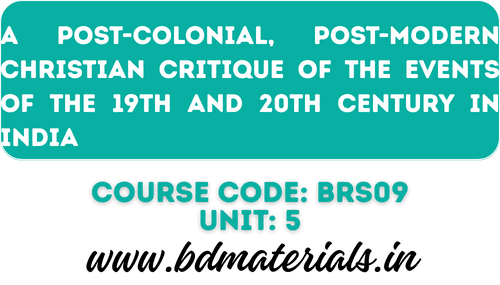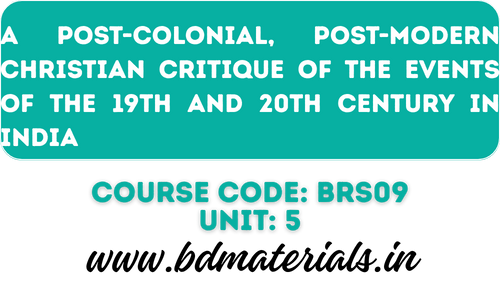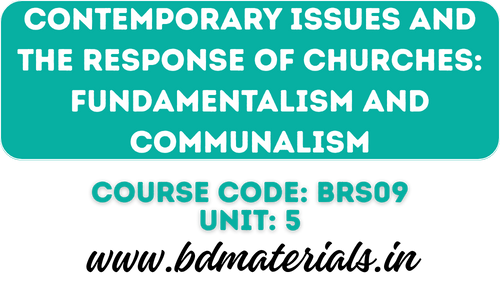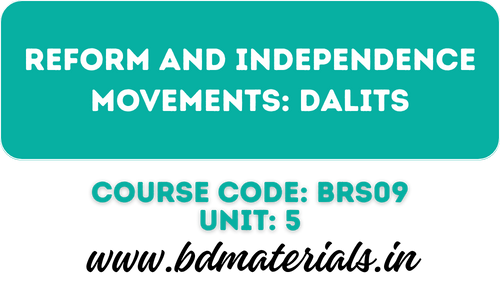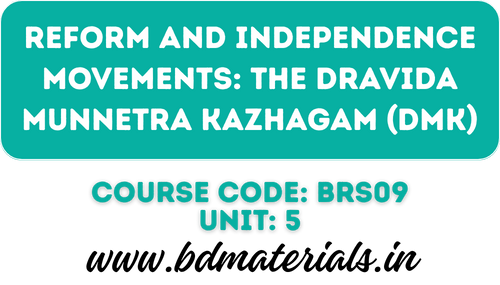Secularism, Minority Rights, Freedom of Religion and Conversion
The term ‗Secular’ had been inserted into the Preamble to the Constitution in 1976 by the 42nd (Constitution) Amendment Act. But surprisingly, no definition of the term is found within the Constitution. This has led to a lot of confusion and controversy in Indian politics with different people understanding the term in different ways. Therefore, an attempt at defining the term ‗Secularism’ is a complicated task. One has to take into consideration the circumstances which led to the inclusion of the term in the Constitution, along with the origin and development of the concept in the West.
The definition of secularism in the Indian context is different from its original understanding in the West. Dr. S. Radhakrishnan had conceptualized Indian secularism in the following terms:
It may appear somewhat strange that our government should be a secular one while our culture is rooted in spiritual values. Secularism here does not mean irreligion or atheism or even stress on material comforts. It proclaims, it lays stress on the universality of spiritual values which may be attained in a variety of ways.
On another occasion, Radhakrishnan describes Indian secularism, as religious neutrality. Jawaharlal Nehru saw secularism as the way for co-existence of religions, in a religiously diverse and pluralistic India.
But, it is a fact that in spite of India being a secular, democratic country, religious fundamentalism has been on the rise in recent years, and this is indeed alarming. Donald Eugene Smith in his book, India as Secular State gives the following definition:
The state is a secular state which guarantees individual and corporate freedom of religion, deals with the individual as a citizen irrespective of religion, is not constitutionally concerned to a particular religion – nor does it seek either to promote or interfere with religion.
The Constitution of India has 22 parts and out of these, the most important is part 3 which deals with the Fundamental Rights of citizens. This has further 8 sections of which the ultimate section is called, ―Right to Freedom of conscience and religion, and Article 25 falls in this section.
The Article 25 of the Constitution of India implies that every person is guaranteed the freedom of conscience and the freedom to profess, practice and propagate his/her own religion. Thus, under clause 1 of Article 25, a person has a two-fold freedom – freedom of conscience, and freedom to profess, practice and propagate religion. Here freedom of conscience refers to absolute inner freedom of the citizen to mould his/her own relation with God in whatever way he/she desires.
The articulation and expression of this freedom in an outward form is ‗to profess and practice religion’. Moreover, ‗profess’ means to freely and openly declare one’s faith and belief. This refers to the right to practice one’s belief by practical expression in any manner, through performance of rituals and rites, and to exhibit religious beliefs and ideas by such acts as prescribed by religious order in which he/she believes. To ‗propagate’ means to spread and publicize one’s religious views for the edification of others. But note should be taken that propagation indicates persuasion and exposition without any coercive element.
Furthermore, clause 2 of Article 25 grants the State the right to regulate activities connected with religious practice’, if these either had any economic, financial and political implication, or involve social welfare and reform issues. Article 26 of the Indian Constitution guarantees every citizen the Right to freedom to manage religious affairs. The right guaranteed in Article 25 concerns individuals, whereas Article 26 is the right of an organized body like religious denominations or any section thereof.
Under clause (a) of Article 26, every religious denomination has the right to establish and maintain’ institutions for religious and charitable purposes. Under Article 26 (b), a religious denomination or organization is free to manage its own affairs in matters of religion’. The State cannot interfere in the exercise of this right unless they are harmful to public order, health and morality. Accordingly, every religious denomination enjoys complete freedom in the matters of deciding what are essential according to the tenets of the religion they hold. The term matters of religion’ includes religious practices, rites and ceremonies considered essential for practice of religion.
In addition, clauses (c) and (d) of Article 26 guarantees religious denominations the right to acquire and own property and to administer such property in accordance with the law. This right is a limited right, and is subject to the regulatory power of the State in clause 2 of Article 25 and also any general property law. Thus, we can see that the right to manage its own affairs in ‗matters of religion’ is a fundamental right whereas the right to ‗manage its own property’ can be regulated by law.
Article 30 of the Constitution deals with ‗the right of minorities to establish and administer educational institutions.’ This article is as put by James Massey, the Magna Carta of the basic fundamental right of minorities, through which they can preserve and conserve their identities as religious or linguistic communities.
Thus, from the above discussion, we can see that the above mentioned Articles of the Indian Constitution guarantee all citizens of India the freedom to profess, practice and propagate any religion and also to maintain institutions. Furthermore, there cannot be any religious tax to promote the interests of any particular religion In a nutshell; we can say that the Constitution firmly prohibits any form of religious discrimination.
Secular India provides freedom of religion and conscience to the citizens; protection for the rights of the minority groups. In the face of various Freedom of Religion Acts enacted by several states, is India still maintaining its secular fabric? A close study of these various Freedom of Religion Acts points otherwise.
Undoubtedly there is no ground justifying conversions brought about by violence or other illegitimate means of coercion. Forceful conversions violate the principle of freedom of conscience and constitute one of the gravest human right violations. However, on examining the existing acts, we can easily realize their unseemliness as the languages adopted by these legislations goes far beyond the protection of the Freedom of Religion and conscience and in no way do these Acts appear to be inspired by the aspiration to protect the same.
Do these various Freedom of Religion Acts preserve the secular fabric of India? Have they been enacted for the preservation of the rights of the minority groups? Do they indeed preserve and maintain freedom of religion as mentioned in the Constitution of India? A deeper study of these so-called Freedom of Religion Acts points otherwise:
A) At the outset, the debate on the topic of ‗conversion’ deserves mention, since it is the main reason behind the birth of the various Freedom of Religion acts. Any legislation to stop forced conversion is a welcome act in a civilized society. Freedom to choose a religion or to convert to a religion according to one’s conscience is the spirit that has to be constitutionally maintained. No religion can claim that they have the right to convert other people. If such a claim is made, that amounts to a violation of the spirit of the Constitution.
However, the right to propagate is a constitutional right provided that it is subject to public order, morality and health. The propagation of one’s faith (religion) can lead to conversion of others. The makers of the Constitution had not clearly spelt out in clear terms the right inherent in Article 25 of the Constitution. Thus, in the absence of clear interpretation regarding the right to convert, the majority cannot dictate terms and impose conditions on the minority norms and interpretations framed by them under threat of their extinction.
B) The various terms used in these Acts demand speculation. All these Acts define conversion as “renouncing one religion and adopting another”. The Arunachal Pradesh Act adds that, “convert’ shall be construed accordingly. Conversely, nowhere is ‗reconversion’ mentioned in these Acts, while as asserted by P.L. John Panicker, although conversion is strongly opposed by Hindus, they are engaged in suddhi movement to reconvert those who left Hinduism. Thus, it is difficult to understand if induced conversion is an offence, then why induced re-conversion is not so?
C) All the Acts include threat of divine displeasure’ within the definition of force’. Thus, as per the laws, today, in Orissa, Madhya Pradesh and Arunachal Pradesh, the Christian who writes or speaks or sings of divine displeasure’ over prevalent human sacrifices is liable to be imprisoned or fined. Moreover, the definition of force is most crucial as it is uncertain as to how it would be interpreted.
For example, if a religion teaches that non-adherents risk divine displeasure, the act of imparting this article of faith may constitute an act of force under the Acts. If it is used within such a broad definition, there is always the danger of misinterpretation which can be a direct contradiction of the right to freely profess and propagate religion guaranteed by Article 25 of the Constitution of India.
D) Furthermore, the words ‗inducement’ and ‗allurement’ are commonly defined by the 3 Acts as any gift or gratification in cash or kind or any grant of a material benefit. Here, it is a cause of concern that the charitable and humanitarian acts which are fundamental to certain religions may be interpreted as ‗inducement’ or ‗allurement’. This can seriously hamper and restrict the freedom of its adherents to meaningfully practice their religion or religious beliefs. Therefore, there is ambiguity as to which activities are permitted and which are prohibited.
E) Another imprecise definition is that of the word “fraud” which has been defined by all 3 Acts as, “fraud shall include misrepresentation or any other fraudulent contrivance”. The vagueness of this definition is apparent. For example, if an individual was told that on converting he/she would feel closer to God but on conversion the converted person did not feel the expected degree of spirituality than can he/she claim to have been misrepresented?
Thus, while these Freedom of Religion acts/anti-conversion laws, on their face, appear to protect religious adherents only from attempts to induce conversion by improper means, the failure to clearly define what makes a conversion improper bestows governments with unfettered discretion to accept or reject the legitimacy of religious conversions. All these vague and ambiguous terms which can be misinterpreted and understood in a variety of ways hamper and obstruct the free profession and propagation of religion, which is a fundamental right of every citizen professing any religion. Therefore, it is a clear indication that these Freedom of Religion Bills are unconstitutional in every sense.
F) Additionally, in the Orissa and Madhya Pradesh Acts, prior intimation to the District Magistrate is required whereas in the Arunachal Act only subsequent intimation is contemplated. Requirement of taking prior permission leaves the power of discretion in the hands of the executive to decide if a person can change his/her religion or not. Given the fact that no time frame is provided for the authority concerned to give his/her permission, an individual’s prospects of conversion are left on the sweet will of the executive. This undeniably is a violation of the prospective convert’s right to choice of religion as embedded in the conscience clause of Article 25 of the Constitution.
Hence, from the above discussion, we can surmise that Anti-conversion laws do not seem to have been intended to defend the fundamental right of Freedom of Religion. Instead, these laws seem to have been intended to ensure that Hinduism would not decrease in importance throughout Indian society. Since, the Hindu religious leaders considered conversion as a symbol of deculturalization and denationalization. The Freedom of Religion bills enacted in different states to stop forced conversion indirectly encourages conversion to Hinduism and denounces conversion to any other religion. Thus, they are well-conceived communal programmes to discourage Freedom of Religion to the minorities. Therefore, they are unconstitutional and detrimental to the spirit of Indian secularism.
The Constitution does not give unlimited right of conversion to anyone. People have the freedom of conscience and, if any person is converted voluntarily owing to freedom of conscience, then it is perfectly all right. There can be no restriction to such conversions. However, if any attempt is made by one religious community to another through unjustifiable influences either by money or pressure or by other means, the State has every right to regulate such activity. Only on this ground can the Freedom of Religion Acts passed by Orissa, Madhya Pradesh, Arunachal Pradesh, or for that matter, any state, be justified and deemed Constitutional.
However, in actual practice, the actual scope of these Acts seems to be restricted to conversion to Islam and Christianity. Since conversion is not a major tenet of Hinduism, but of Christianity and Islam. Therefore, these Acts disproportionately affect the minorities, especially Christians and Muslims. These anti-conversion laws are not constitutional and on no ground can they be justified as they are deceitful, and they contradict the Constitution of India and the Freedom of Religion granted by the Constitution; they even affect the individual’s ‗freedom of conscience.’
Finally, if conversion to Christianity and Islam is to be made into an issue, then re-conversion to Hinduism must also be made an issue and must be brought under the purview of the Freedom of Religion Acts. For whether conversion is called suddhi (purification) or ghar waapsi (Homecoming) it is still conversion. Just as a rose by any name is still a rose, so too, conversion under any nomenclature is still conversion.
Friendly Note
Bachelor of Divinity Materials is your go-to resource for comprehensive Biblical studies, supporting students in Bachelor of Divinity (B.D.) and other theological courses. Our platform offers access to the full syllabus, detailed answers, and a vast collection of assignments, study guides, articles, and research papers to help you excel academically.
We provide downloadable PDFs of study materials, including books and journals, for convenient learning anytime, anywhere. Whether preparing for exams or conducting research, our resources cater to both students and scholars in biblical studies.
Committed to empowering theological learners, we aim to deliver high-quality, authentic study materials. Explore Bachelor of Divinity Materials to deepen your understanding of God’s Word and Christian doctrine, making it a valuable resource for aspiring ministers and anyone dedicated to theology.

